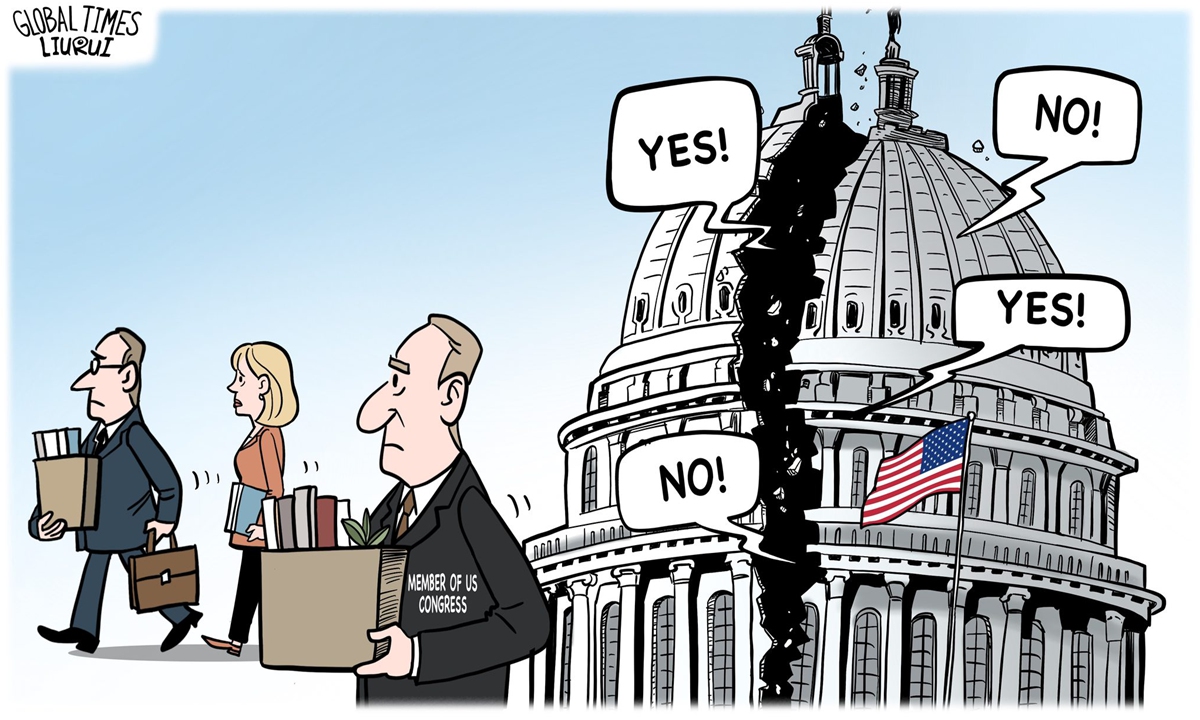Why is the 118th US Congress trapped in unprecedented ‘legislative dysfunction’?

Illustration: Liu Rui/GT
The US' 118th Congress is halfway through its two-year term, having convened in Washington, DC, on January 3, 2023. Over the past year, the 118th Congress has frequently garnered attention and "made history" through significant events such as voting to remove the house speaker and engaging in arduous efforts to elect a new speaker, as well as expelling members of Congress. It also has come dangerously close, multiple times, to causing a government shutdown, highlighting the intense internal conflicts between the two parties amid the polarization of American politics. As a result, it is possible that this Congress will go down in history as one of the least effective in US history.
As the highest legislative body in the separation of powers system in the US, Congress is currently facing an unprecedented state of dysfunction in fulfilling its main responsibilities. According to reports, legislative output in this Congress has plummeted, with only 34 bills passed in 2023, which is less than one-tenth of the total number in the previous Congress.
Considering that in 2024, both parties will focus their main efforts on the election rather than pushing for legislation, it's likely that by the end of the term in January 2025, the number of bills passed by this Congress will hit a historic low.
Why is this Congress experiencing a historic "legislative dysfunction"? The mainstream media in the US has been reporting on this issue, but few have delved into a deeper analysis. There are three main reasons for this.
First, this is an inevitable result of the polarized politics in the new era of the US, and it is also a prominent manifestation of the escalation and derailment of the fierce battle between the two parties. Since the 2016 presidential election, left-wing and right-wing populism has taken the stage in mainstream American politics, exerting a profound influence on the political ecology of both parties.
The controversies surrounding the 2020 election and the events that followed, such as the Capitol Hill riots, have made the contradictions between the two parties increasingly difficult to reconcile, to the extent that they have fallen into a zero-sum game. After the 2022 midterm elections, the Republican Party regained control of the House of Representatives and made obstructing the Biden administration and the Democratic Party's agenda its top political priority, sparing no effort to implement "veto politics." At the same time, due to the roughly equal distribution of seats between the two parties in both the Senate and the House, a small number of defectors within each party could open the door to opportunities for the other party. As a result, both sides emphasize ideological alignment and are unwilling to make compromises.
Second, this is a spillover result of the further conservatization and polarization of the Republican Party under the influence of Trumpism. Donald Trump's presidency has profoundly shaped the identity and values of the Republican Party, leading to the rapid rise of the party's far-right forces and their enhanced fight for power within the party after the 2022 midterm elections.
From the very beginning, the current Congress has been plagued by the farce of infighting within the Republican Party. The house speaker election and removal drama around Kevin McCarthy in 2023 have almost paralyzed Congress for a significant period of time. The far-right wing of the Republican Party has capitalized on its power to influence legislation, pushing its own agenda on issues such as the debt ceiling, government spending and immigration policy. As a result, the functioning of Congress has become highly politicized and fragmented, leading to a prolonged "seesaw battle" and "war of attrition" between the two parties and factions within the Republican Party. In such an environment, it is naturally challenging for Congress to carry out effective legislative activities.
Third, this situation is the latest manifestation of Congress's political insanity, governance incapacity and dysfunction. Congress has always been the cornerstone of the US constitutional system, playing a crucial role in promoting the rule of law and modernization in the US as the highest legislative body. However, as US politics has entered a new period of chaos, Congress has gradually deviated from its legislative intent, becoming a tool for lawmakers from both parties to compete for power and personal gains.
Such a situation has been particularly prominent since the current Congress began its work. Many lawmakers have used radical words and actions to seek attention. They have been eager to attack their opponents, neglecting the concerns of their constituents and US society. In terms of legislation, most of the bills currently in effect either focus on ensuring the basic operation of the government or have no controversy in the US but limited impact on the promotion of the country's socio-economic development. This has resulted in the US public's increasing disappointment in Congress: The legislative body's job approval dropped to 13 percent, the lowest since 2017, according to a US poll in October.
Inefficient legislation rarely seen in history and frequent farces are becoming the "embarrassing" footnote of the 118th Congress. As the 2024 presidential election starts in the US, the two parties are engaging in fierce competition, which may make legislation in Congress further politicized and weaponized and further amplify the chaos and shortcomings of US politics.
The authors are research fellows at the Department of American Studies of the China Institute of International Studies. opinion@globaltimes.com.cn


